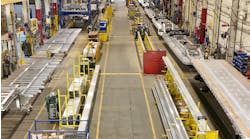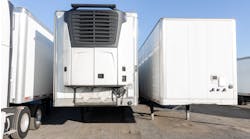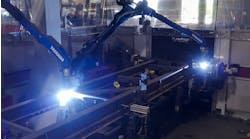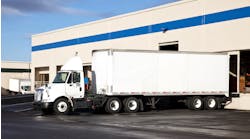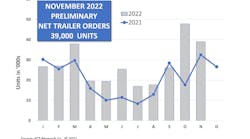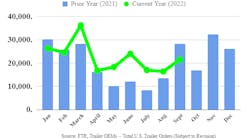The major truck trailer manufacturers set new production records in 1999. It was the all-time best year for many of the largest companies, but for some medium-size companies the bloom was off because of a slowdown in individual specialized markets.
The industry as a whole set a new record, producing over 300,000 complete truck trailers for the first time in history. This is a difficult statement to make because it is contrary to the published figures reported by the Census Bureau and US Department of Commerce. Census reported 12 months production in 1998 of 344,017 complete trailers-a gross exaggeration. Now a year later, this fictitious number still has not been corrected.
However, market experts put the actual number produced in 1998 at something less than 300,000, maybe as low as 275,000. Trailer/Body Builders published its figures a year ago, using 289,000 as its best estimate of 1998 production. However, some other trade publications have perpetuated the myth of a 344,000 production year in 1998.
For 1999, the 12 months Census figures add up to about 273,000 complete trailers. That figure is as ridiculously low as the 1998 Census total was high. It's almost as if Census is throwing a low ball to average out last year's high ball figure.
Ken Vieth Jr of ACT Research Co in Columbus, Indiana, says the ACT survey of trailer manufacturers indicates a total of more than 317,000 complete trailer shipments in 1999, up 11% from their estimate of 285,000 in 1998.
Peter Toja of Economic Planning Associates in Smithtown, New York, is a little more conservative. He puts the 1999 trailer production at 302,000, up 7.7% from 280,000 for 1998.
Ken Kremar with WEFA Inc in New York City says that Class 8 truck production was up 25% in 1999, so it's easy to see a 10% to 15% increase in trailer production. WEFA pegged 1998 trailer production just under 280,000, so a 10% to 15% increase would be 308,000 to 320,000 complete trailers in 1999.
Trailer/Body Builders is using 310,000 complete trailers as the 1999 figure until Census publishes its annual correction-for both 1998 and 1999.
\When comparing total US production with the total for our 33 largest trailer manufacturers, we must subtract the Hyundai production that is actually produced in Mexico for the US market, as well as the two Canadian plants reported here, the Manac production and Mond's share of the Trailmobile total. When subtracting these non-US plants from the North American plants in the table, the US total is about 284,300.
The 31 leading US trailer manufacturers reported here built 91.7% of the truck trailers manufactured in the US. The top 25 trailer manufacturers produced 90% of the trailers, which is more than last year's report of 87%. This percentage share of the market would change, of course, if a total US production is reported substantially different from our estimate of 310,000 complete trailers in 1999. Wabash, the largest trailer manufacturer, has a 22.6% share of the 310,000 trailer market, and the top three manufacturers build half the trailers produced. The top five manufacturers have a 65% share, just under two-thirds.
Here is how the top 33 North American trailer manufacturers ranked during 1999, the best trailer production year ever-for the second year in a row:
Wabash National Corporation built almost 70,000 truck trailers in 1999, a 14% increase over 1998 unit numbers. The 1998 figure was a record for the most trailers ever built by any one trailer company, and now Wabash has topped that record again.
At the same time, Wabash released financial results for the past year showing net sales of $1.5 billion, a 13% increase over the '98 year. Net income was $38.8 million, a 67% increase over 1998.
Some 37,000 of the Wabash trailers were 53-ft DuraPlate vans with composite sidewalls using Wabash's proprietary thin sandwich panel of high-tensile steel sheets enclosing a vinyl core. First introduced in 1996, the DuraPlate van has become the number one selling trailer in the nation, according to Wabash.
"We were operating at capacity all year," says Jerry Ehrlich, CEO of Wabash. "We were somewhat limited by our ability to produce the DuraPlate material and assemble the vans. The material capacity has been expanded for the coming year, and our assembly operations have been expanded as well." The Ft Madison, Iowa, plant is now assembling DuraPlate trailers also, receiving the precut and prepunched sidewalls from the Lafayette, Indiana, plant.
Even though the industry expects some pullback in 2000, Ehrlich says he hopes Wabash can increase its unit numbers by 10% to 15% in order to increase revenues by 20%. To that end, the Scott County, Tennessee, plant capacity is being doubled, and that expansion should be completed and in full production by summer. Platform trailers in the Scott County plant will be finished automatically by E-coating with an epoxy primer and then dipping in urethane for the final coat.
Wabash reported a strong backlog of $1.1 billion at the end of 1999. That figure represents almost a year's production at the wholesale level. (The Wabash and Fruehauf Trailer Services retail branches generated about 20% of the company's revenue in 1999.)
Great Dane Limited Partnership recorded another 16% production increase in 1999, after a huge 36% increase the prior year. No new plants were involved, but the company has made capital investments to be more productive and efficient, according to H T (Skip) Skipper III, senior VP sales & marketing.
Great Dane built almost 8,000 more trailers in 1999 than in 1998. The 58,454 final figure includes 43,217 dry freight vans, 12,162 refrigerated vans, and 3,075 platforms.
Although the company has a healthy backlog and ordering is down only slightly, Skipper thinks that shipments in 2000 may be down on the van side, if only because of a certain "nervousness" in the market. However, the first half of the year looks like a continuation at the same level.
Great Dane has eight trailer plants: Savannah, Georgia; Brazil and Terre Haute, Indiana; Memphis, Tennessee; Wayne, Nebraska; and three former Pines Trailer plants in Kewanee, Illinois, and Greenville, Mississippi.
Trailmobile Corporation in the US and Canada increased production 10% in 1999. The combined operation of Mond Industries in Mississauga, Ontario, and Trailmobile plants in Illinois, Arkansas, and Kansas, produced 31,329 units in 1999. That's 2,759 more than the 28,570 trailers the two companies produced in 1998, when Trailmobile turned out almost 24,000 trailers and Mond built 4,652 trailers.
Trailmobile added a new refrigerated trailer plant in Liberal, Kansas, in 1999, as well as completing the acquisition of Mond Industries. This year Trailmobile has announced its intention to acquire the trailer business of the Strick Corp, which builds some 11,000 trailers a year plus 6,000 or 7,000 container chassis, but that deal has not been completed yet.
Trailmobile President Jay Nieszel says he is looking for another good year in 2000.
Utility Trailer Manufacturing increased production 16% again in 1999, after the same percentage increase in 1998. Of the 30,989 trailers completed in '99, about 44% were refrigerated. The total number could have been higher, but its plants were limited by capacity and the product mix. About a third of the reefers were for foodservice delivery, and these trailers require many more hours of work to install side doors, center walls, bulkheads, and refrigeration for multi-temperature operation.
Utility Trailer remains the largest refrigerated trailer manufacturer. The company is taking major steps to insure that market position. It is completing the world's largest refrigerated trailer plant in Clearfield, Utah. The 500,000-sq-ft automated plant on 49 acres will have two moving assembly lines. Tooling and computerized equipmentfor the first assembly line is now in place. Plans are being made for the official opening of the $27-million plant.
Meanwhile, Utility has announced that its seventh regional plant will be built in Glade Springs, Virginia, to service Utility dealers in the eastern portion of the United States and Canada. The 250,000-sq-ft, $14-million plant will open in the autumn.
Craig Bennett, sales VP, says he expects the market in 2000 to be even or a little up for reefers, probably flat for dry freight vans, and down for platforms because of the easing off of the construction market.
Stoughton Trailers increased production of van trailers and platforms 17% in 1999, building 14,673 complete trailers. Container chassis production increased 64% to 6,618 units, and domestic container production was up 50% to 7,221 boxes.
Stoughton closed its refrigerated trailer plant in Brodhead, Wisconsin, in early 1999 and is now converting that modern plant to build van trailers. It is expected to start up production again in April. Main production for complete trailers is in the Stoughton WI plant, while containers and chassis are produced in the Evansville WI plant.
Stoughton's order book for vans is filled through May, and its container and chassis plant is booked through August, but its net order backlog is less than a year ago. Stoughton CEO Don Wahlin expects van production to be down in 2000, and the prospect for any further container and chassis orders is "grim."
Strick Corporation increased production substantially in 1999 even though the trailer unit numbers don't show it. The mix of trailers saw more long trailers in 1999 compared to 1998 when a large number of short doubles trailers were produced. Strick built about 11,000 van trailers in '99 and 7,000 container chassis, an increase of about 1,000 chassis compared to '98.
Strick President Denny Williams expects another strong year in 2000 even though the same backlog is not there. The van business at Strick is fairly well booked through the third quarter. Adding to that optimistic outlook is a new van trailer plant that is currently in startup operations in Abbeville, South Carolina.
Trailmobile Corporation has announced its intent to purchase the van trailer business of Strick Corporation. Plans are to continue to operate the Strick Corporation van business separately. A year ago, Trailmobile acquired a majority interest in Mond Industries of Mississauga, Ontario, Canada, and has continued that business under the Mond name.
Dorsey Trailers enjoyed a profitable year with new trailer sales up 9.8%, and gross profit margins continuing to trend positively, according to John L Pugh, chief executive officer. The actual unit number of trailers produced was up 7.6% to 9,013 complete trailers and 409 container chassis. The breakdown includes 5,578 dry freight vans, 1,663 refrigerated trailers, 1,523 platforms, and 249 dump trailers. Dorsey reported a backlog of over $45 million on October 1, 1999, and since then, there has been "no deterioration and no cancellations," according to Allen Cain, VP-accounting.
HPA Monon Corp increased production of van trailers by 15% in 1999. It built 8,386 van trailers, which is 1,073 more than in 1998. The biggest increase at HPA Monon was in the container chassis line, which expanded 78%. The company built 5,428 container chassis, 2,384 more than in '98. HPA Monon also built a few domestic containers (132), down from 395 the previous year. HPA Monon does not have a dedicated container line, but builds these domestic containers on the van trailer line.
"We had a big increase in both vans and chassis," says HPA Monon President Bill Herndon, "and we did it with essentially the same number of employees." Employment at HPA Monon increased only slightly (less than 3%) during 1999. "Our backlog is shorter this year than last year at this time, but we think we'll build about the same number of trailers in the year 2000," he says.
Manac, Canada's largest trailer manufacturer, had an 11% increase in production, following a 14% increase the year before. Manac built some 8,200 trailers in its two plants. The Manac van trailer plant is in Orangeville, Ontario, and its headquarters plant is in Saint-Georges-de-Beauce, Quebec.
Charles Dutil, executive vice-president, says Manac is increasing capacity at both plants and hopes to build even more trailers in 2000. Its backlog in January was above the year-ago level.
Hyundai Precision America had a modest 9% increase in truck trailer production, to 5,716 units, and a 50% increase in domestic container production, to 4,827 units. However, Hyundai built no ISO containers in 1999, so its total container production was down. About 400 of the van trailers and domestic containers were refrigerated.
Hyundai's biggest output was in container chassis. The company built 15,194 container chassis in 1999, up 32% over 1998. Hyundai also produced 3,110 CROP units (Container Roll-On Platform) under a US Army contract.
Hyundai Precision America has its headquarters in San Diego, California, and its manufacturing plant is across the border in Tijuana, Mexico.
Lufkin Trailers had a slow start in 1999 following its record production year in 1998. A workforce reduction in January was followed by rehiring to full strength in April. Production figures reflect that reduced production period.
Lufkin finished the year with 5,632 complete trailer deliveries. This includes 4,409 vans, 955 platforms, and 268 dump trailers. In addition to these complete trailers, the company delivered 23 converter dollies. The total is 1,343 fewer trailers than in Lufkin's all-time record year of 1998, or down 19%.
Roland McGee, new trailer sales manager, says the year 2000 is starting out with a slowdown the same as in 1999, but he expects sales to pick up in April. After a slow first quarter, he expects the company to return to full production for the rest of the year. He is expecting Lufkin to build about the same number of trailers as last year.
Transcraft Corporation had a good year, but not quite as good as 1998. Flatbed sales were off by six trailers or a tenth of one percent. The Transcraft steel platform plant in Anna, Illinois, and the composite steel-aluminum trailer plant in Mt Sterling, Kentucky, shipped a total of 5,311 platforms in 1999.
Transcraft President W R Douglas attributes this plateauing to overbuilding the previous year. The company increased production 18% in 1998 and 43% in 1997. Transcraft dealers overstocked during 1998 and had to work off this inventory during the first half of 1999. Production was on track for the last half of '99 even though the flatbed market was slowing.
Prospects for 2000 are good in a strong market. The building trades are strong even though steel shipments are slowing down, says Douglas. If the auto industry does well, so will platform trailers.
Road Systems Inc of Searcy, Arkansas, the wholly owned subsidiary of CNF Transportation, produced 4,173 new and remanufactured van trailers in 1999, up 16% from 1998. Lynn Reinbolt, general manager, says that 90% of these were 28-ft doubles trailers. The company also produced 600 new and remanufactured converter dollies in 1999, more than any other manufacturer reported.
Trail King Industries recorded a modest increase in 1999, building 3,705 truck trailers. This includes platforms, drop deck, and lowbed trailers produced by Trail King in Mitchell, South Dakota, as well as dump trailers produced in Brookfield, Pennsylvania. It does not include platforms produced in Puebla, Mexico, through a joint venture. In addition, Trail King builds lighter tag trailers having axles under 10,000 lb that are not counted in the figures above.
Kentucky Manufacturing recorded a 16% increase over 1998 production, building 2,750 trailers. Most of these were drop-frame custom vans for household-goods moving companies, but a few (350 or so) were straight-frame dry freight vans built for regular customers in the household moving industry. Larry Hartog, president, says prospects are good for a continuation of the present production level.
Benson International Inc built 2,150 trailers in 1999, up 23% from '98. This includes dump trailers, logging trailers, moving floor refuse trailers, lowboys, and a new platform introduced a year ago. They are built in four Benson Intl plants located in Meyersdale, Pennsylvania; Allen and Pikeville, Kentucky; and Mineral Wells, West Virginia. Greg Hayes, director of marketing, says the company is expecting about a 5% growth in 2000.
East Manufacturing Corporation reported production down by 320 units or 14% because of a 13-week strike. Final shipment figures were 1,934 all-aluminum platforms, dump and refuse trailers, and composite steel-aluminum platforms. David Tate, president and CEO, said the company signed a four-year contract, ending the strike on April 24. Labor relations and production rates are back to normal.
Ravens Inc reported slightly larger trailer production of 1,875 units in 1999. Ravens aluminum dump trailers produced in its Jacksonville, North Carolina, plant were up 5% to 596 units. Ravens aluminum platform trailers built in its Kent, Ohio, plant were down 13% to 1,125 units. The big change at Ravens was its purchase of the former Galbreath dump trailer business in Knox, Indiana, in mid-April 1999. That production in the last 81/2 months of 1999 amounted to 154 steel dump trailers.
Polar Tank Trailer Inc increased production slightly in 1999, and Jim Jungels, president, says they expect to build more again in 2000. The company's backlog is good and customers express optimism about the coming year. He says the driver shortage is the one big constraint. The three Polar plants in Opole and Holdingford, Minnesota, and Springfield, Missouri, shipped 1,850 tank trailers and dry bulk trailers in 1999.
Timpte Inc had a "real good year" in spite of the national market for agricultural hopper trailers being down 40% to 45%. About 99% of Timpte's business is in hopper trailers. The company shipped 1,650 trailers in 1999, down 28% from the prior year. Kenny Allred, president of Timpte Inc, thinks production may be up 10% to 15% in 2000, but that depends on what the weather does.
Brenner Tank in Fond du Lac, Wisconsin, experienced a 5% decline in production in a difficult market, shipping 1,420 tank trailers. After the mills tacked a 20 cents surcharge for nickel stainless steel onto metals orders, the price for a type 316 stainless steel trailer shot up $1,500 to $2,000. Transporters, accustomed to declining trailer prices in a very competitive market, reacted with shock. Bob Agnew, president of Brenner, believes that cost will continue to be an issue for the coming years. With all the unknowns, he looks for a flat year in 2000.
Dynaweld Inc increased production to 1,275 units, up 6% from its 1998 level of 1,200 truck trailers. In addition, the company built many lighter capacity tag trailers for hauling skid-steer loaders and such smaller construction equipment. With plant and offices in Aurora, Illinois, Dynaweld specializes in lowbed and detachable gooseneck trailers, platforms, and construction equipment trailers.
MAC Trailer Manufacturing increased trailer production 61% in 1999 to 1,210 units, and Michael Conny, president, says they plan an even bigger year for 2000. The company has specialized in aluminum dump bodies and is one of the largest manufacturers of aluminum live floor trailers for refuse. MAC opened a second plant in its home town of Alliance, Ohio, in November 1999. This new plant is producing steel end dumps and a new aluminum platform that will be introduced at the Mid-America Trucking Show in March. Conny says the company will produce about 1,800 trailers this year.
Beall Corp is the biggest tank trailer manufacturer in the West. The company shipped 1,200 trailers of all types in 1999, up 18% from 1998. In addition, Beall built 200 solo bodies for mounting on truck chassis. These include both tanks and dump bodies, many for use with pull trailers. Beall makes aluminum gasoline transports and pneumatic dry bulk trailers, stainless steel tanks, and aluminum and steel bottom dumps. With four plants in Portland, Oregon, Billings, Montana, Turlock, California, and Seattle, Washington (dump bodies), 90% of their sales are west of the Mississippi River. Daniel Jarboe, VP-marketing, says stainless steel tanks are slow, and that probably will not change in 2000. Aluminum sales are good, and he expects that to continue as well.
Clement Industries built 1,197 dump trailers in 1999, a 16% increase over 1998 production. This is right on target with last year's projection. Glen Hicks, president, says Clement has a good backlog, but ordering is slowing.
Clement builds steel end dumps, bottom dumps, and roll-off chassis at its plant in Minden, Louisiana.
Kalyn/Siebert built 1,178 truck trailers in 1999. This includes 902 construction equipment trailers built in its Gatesville, Texas, plant-lowboys platforms, multi-axle heavy haulers, and heavy-duty tag trailers. Kalyn/Siebert Canada shipped 276 end dump trailers and live floor trailers from its plant in Trois-Rivieres, Quebec. The Canadian Fabrex operation was purchased by Kalyn/Siebert two years ago and completed a new manufacturing plant last year.
Reliance Trailer Co LLC of Cotati, California, and Spokane, Washington, built some 1,100 truck trailers in 1999, down from 1,670 the year before. In addition, the Cotati plant built 700 dump bodies for mounting on truck chassis.
Kidron Inc built 1,000 refrigerated distribution trailers in 1999. Most of these have two and three refrigerated compartments, requiring center partitions, secondary bulkheads, side doors, false ceilings, and all the other extras that go into refrigerating the second and third compartments. Kidron's primary business is in building refrigerated truck bodies. The company has manufacturing plants in Lakeland, Florida; Washington, North Carolina; and Kidron, Ohio.
Pitts Trailers had a dismal first half because of a decline in the timber industry where 95% of their trailers are sold. However, the market came back in the second half of 1999, limiting the drop in sales to 35% for the year. The company built 980 trailers in 1999, including logging trailers and lowboys used as loader carriers. Jeff Pitts, president, says he expects 2000 to be a normal year, and the company will be back at the 1,500-unit level. An expansion of the Pitts plant in Pittsview, Alabama, is underway to increase production.
Armor Chassis LLC is a new manufacturer of container chassis and platform trailers located in Ridgeland, South Carolina, 25 miles north of the Port of Savannah, Georgia. During the startup phase from October through December 1998, the company produced some 500 container chassis. During the first full year of production in 1999, Armor built 3,200 container chassis and 300 platform trailers. Located in the Cypress Ridge Industrial Park in Ridgeland, the company is continuing to build container chassis at the rate of 12 a day and platforms at the rate of four a day, reports Jimmy Phillips, general manager.

